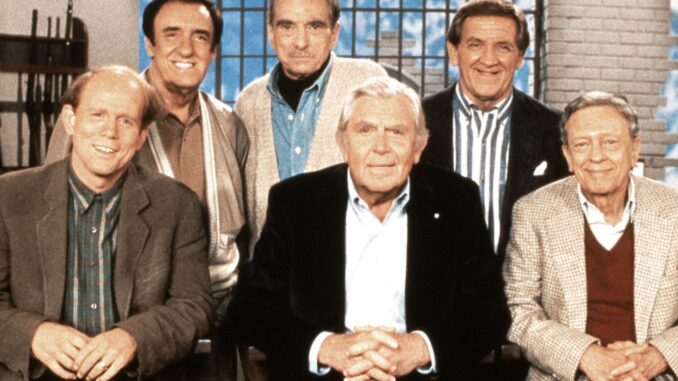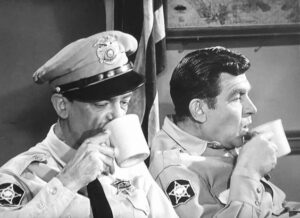
I was on vacation when I saw the news: Andy Griffith had died July 3 at his home in North Carolina at age 86. As usual, I had scheduled a few blog posts to go up in my absence, and because it was the day before Independence Day, Tuesday’s was about which TV shows best shaped and defined America. The first one that came to mind, well before the news, was The Andy Griffith Show.
America is too big and diverse, of course, for any one person or TV show to define it. But Griffith — through Andy Taylor and his other memorable characters — did something different: his was one of those authentic voices that, by being so specific, appealed to something broader.
The Andy Griffith Show aired before my time, from 1960 to 1968, so I knew it as nostalgia TV. (A spin-off/continuation, Mayberry RFD, kept the show’s small-town setting alive through 1971.) But the show was a kind of work of nostalgia even as it originally aired. Its laconic voice and rural setting were a contrast with the urban settings and wisecracking pace of much of 1950s TV comedy. And even while it depicted a small Southern town, largely isolated from the world’s troubles but for the occasional argument and passing city slicker, the news of the civil rights era was already showing a different picture of small-town America in real life.

As Sheriff Taylor, Griffith was reassuring for the same reason he was funny. In contrast to previous big-voiced sitcom stars — Lucille Ball, Jackie Gleason — he let his co-stars, like Don Knotts, take the comic lead. Sheriff Taylor was the calm, imperturbable sounding board and problem solver. A single dad, and by extension a paternal figure to all of Mayberry, Taylor was a lawman who showed that patience and good humor could be the most effective weapons. At least in this half-hour of TV, there was no problem that couldn’t be solved with plain talk, and maybe some of Aunt Bee’s biscuits.
Part of what made this work was that, like many great sitcom stars, Griffith (also a producer of the show) built a character that worked with, not against, his voice. He didn’t do wacky and he didn’t force it. Instead, his sheriff was wry and bemused, his understatement and reactions serving as a kind of force multiplier for the show’s jokes. Though the show was often lumped in with the “rural” comedy trend of the 1960s, Griffith’s comedy added sophistication to the sitcom, expanding its possibilities with comedy that came out of character rather than just gags.
Andy Taylor wasn’t Griffith’s only landmark character in a long career, of course. (He had a late-career comeback with the detective show Matlock, which I wasn’t personally a fan of but won him the feisty allegiance of Abe Simpson, among others.) His first and most memorable movie role was as Lonesome Rhodes, the folksy TV host turned demagogue in 1957’s A Face in the Crowd. Rhodes was a villain as well suited to Griffith’s voice as Taylor: ambitious, insinuating and deceptively populist, he prefigured cable-TV manipulators that would come along decades later.
In Rhodes and Taylor, Griffith showed the fine line between the best and worst of Americana: how wisdom could be hidden in small-town guilelessness, how wickedness could package itself in a voice as sweet and rich as pecan pie. Andy Griffith’s voice wasn’t one of the loudest in TV or pop culture, but the man made himself heard all the same. RIP.
